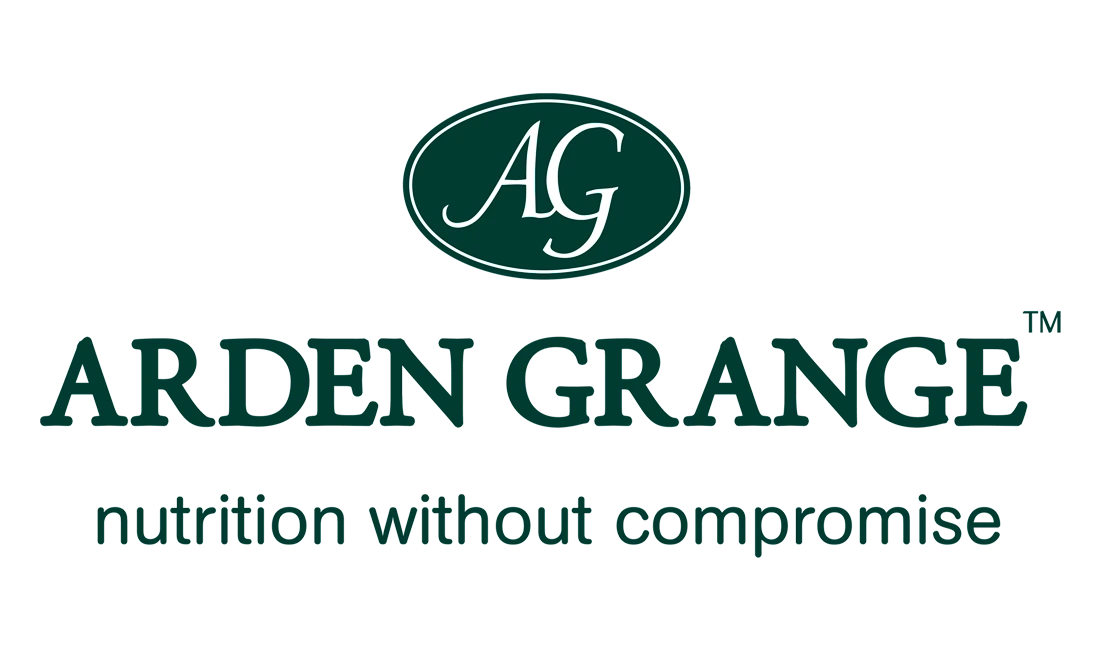Feeding pregnant or lactating mums
Arden Grange Prestige is a delicious, energy-dense diet which provides a concentrated source of calories and all the nutrients required during pregnancy and lactation. This product has the following benefits:
- A high protein level to support cell and tissue growth, and ensure optimal levels of essential amino acids needed for hormone and enzyme production and function.
- The correct level of fat to allow the bitch’s increased needs to be met without having to feed overly large amounts.
- Krill, which is a very good source of EPA and DHA Omega-3 fatty acids. Pregnancy diets must supply DHA because it cannot be synthesised in the body, and it is needed for foetal nerve and retinal development.
- Sufficient carbohydrate, which is important because during the third trimester, a bitch derives 50% more of her energy from glucose. Insufficient carbohydrate also reduces the lactose level of milk.
- Natural antioxidants which may help protect against the increased oxidative stress which occurs during pregnancy due to higher oxygen consumption and metabolic changes.
- The correct calcium to phosphorous ratio. Too much calcium is dangerous, and can actually cause hypocalcaemia (low blood calcium levels) because it down-regulates parathyroid hormone synthesis and secretion, which reduces the dam’s ability to meet demands for calcium mobilisation. We do not recommend supplementing an already complete and balanced feed with additional minerals or vitamins unless under the guidance of your vet to correct a diagnosed nutrient deficiency.
- A consistent source of other important pregnancy minerals (iron, copper and zinc) & vitamins (folic acid).
Nutritional needs do not start to increase until week 6 of the pregnancy. This is because puppy foetal growth is non-linear, and at this stage less than 30% complete. It is still however sensible to consider your bitch’s requirements early on so that diet changes can be instigated gradually, and she is settled on your chosen product before she starts to need more calories. It is important to keep her at an ideal weight because underweight dams may not have sufficient nutritional reserves to support the foetuses; whilst being overweight can result in overly large puppies, which can increase the risk of dystocia (difficulty giving birth).
There are many factors that will influence the amount of calories a bitch needs to support her during pregnancy, with the size of the litter being particularly significant. By the time of whelping, most bitches will need up to 40-60% more calories than their usual pre-pregnancy intake. Increasing the allowance gradually (so by 10-15% at week 6, by 20-30% at week 7, by 40-50% at week 8 and 60% at week 9) helps to minimise the risks associated with over-feeding such as flatulence and loose or very bulky stools. Splitting the allowance over 3-4 feeds per day (taking care not to exercise too near to a meal-time) is generally considered sensible because the uterus will be taking up more space in the abdomen, so there is less room for food.
Some bitches can become quite picky during pregnancy. It is important to ensure she is eating regularly, and eating enough to avoid nutrient deficiencies, fluctuating blood sugar levels and loss of energy. It is not uncommon for a bitch to lose her appetite 2-3 days prior to whelping, but do try to tempt her to eat because if she is lacking energy, whelping will be more difficult for her. Insufficient food also leads to insufficient milk. During lactation, it is absolutely imperative to ensure your bitch is eating properly, otherwise she will be more at risk of hypocalcaemia. Fortunately, there is usually a natural appetite increase after whelping.
As with feeding quantities for pregnancy, those suggested during lactation are only to be used as a broad estimate because requirements can range from 2-4 x a bitch’s pre-pregnancy energy requirement. Your eye will tell you if she is getting too fat or too thin, and you can regulate her intake accordingly. Close monitoring of faecal output is important too. As a guide, you may wish to increase her normal intake by 130 – 140% in the first week, rising to 180% in the second week and up to 250 – 300% by the third week. The size of the litter will affect the amount of food the bitch requires and this should be taken into account.
Different breeders and different breeds will have variable weaning timetables. However, if the litter is unusually large, you may wish to start weaning slightly earlier than normal. Most breeders wean gradually, starting when the puppies are around 3 weeks of age, and during this time the bitch’s intake of food should be gradually reduced. This will mean that by the time the puppies are fully weaned, the bitch is back down to her normal daily amount; although she may need a little more food for longer if she has lost a significant amount of weight through feeding her puppies.
When starting the weaning process, it is a good idea to move the dam to a separate area for a while before offering their food (which should be mashed up and well mixed with warm water before offering it to them), because if they have been feeding from Mum they will not be hungry, and it may put them off trying their Arden Grange Weaning Puppy food. Don’t forget that they are used to having warm milk from Mum and may reject food if it is too cold. Once they have eaten some of their ‘new’ food, then Mum should be put back in with them for a comforting top-up.
It is important to remember that puppies lose the ability to digest lactose (milk sugar) shortly after weaning, and this is why many adult dogs are intolerant to milk products. Some sensitive dogs are allergic to casein (milk protein) and this is why we do not include any dairy products in our diets. If using milk replacement products, it is safest to use formulations specific to puppy weaning such as Welpi.
If your bitch suffers from food allergies, dietary intolerance or has a particularly sensitive digestion; then a change of diet may be something you are sensibly wary of. It may well be that she can continue with her regular food, providing the nutrient balance is appropriate for pregnancy and lactation. Do be aware that portions may need to be higher than if you were using a product specifically formulated for pregnancy. Higher portions can be accommodated by introducing an extra feed.
Some breeders prefer the convenience of feeding the dam and puppies the same product. Arden Grange Weaning Puppy, Arden Grange Puppy Junior or Arden Grange Sensitive Puppy Junior may be fed to bitches during pregnancy and lactation as an alternative to Arden Grange Prestige.


 Puppy
Puppy
 Adult
Adult
 Senior
Senior
 Sensitive
Sensitive
 Treats
Treats Kitten
Kitten
 Adult
Adult
 Senior
Senior
 Trusted British Brand
Trusted British Brand

